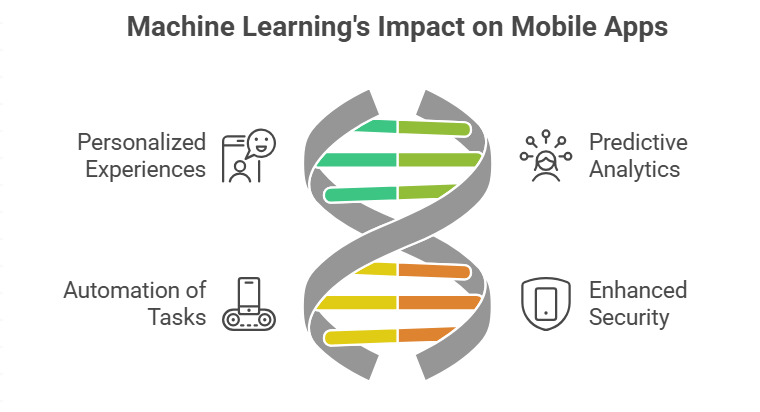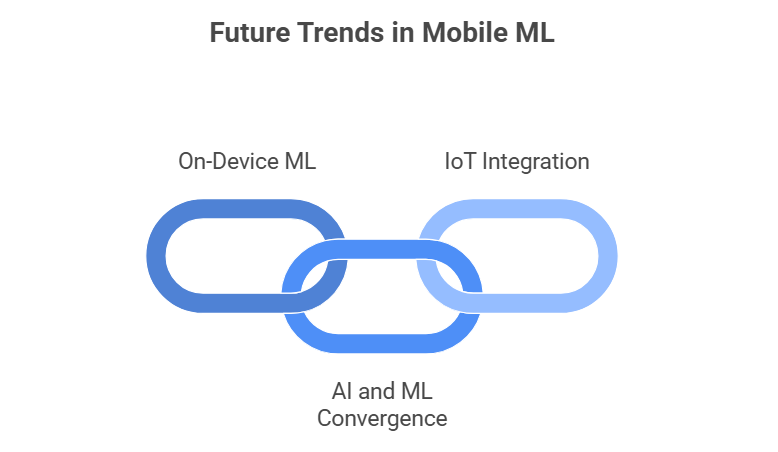Why Mobile app development is being disrupted by machine learning apps
The mobile app development landscape is evolving rapidly. Within a few years, mobile apps evolved from being just tools to becoming intelligent systems that can learn, adapt, and evolve. One key driver of this change? Machine learning (ML). This technology is totally reshaping how apps are created, built, and consumed, making them smarter, more personalized, and more intuitive.
At App Maisters, we’re constantly seeing how machine learning development is revolutionizing the mobile app industry. It’s not just a passing trend ML is changing the game, and businesses that don’t embrace this shift risk being left behind.
What is Machine Learning and Why Does it Matter for Mobile Apps?
Machine learning is an area of artificial intelligence (AI) that enables applications to learn from information and make decisions without explicit programming. It is somewhat akin to providing applications with the capability to think for themselves, depending on the trends they derive from user activity and data inputs.
This translates into the fact that rather than remaining static, mobile apps can learn and evolve over time, providing experiences that are unique to every user. From content suggestions tailored to individual users to predictive analysis, machine learning in mobile apps is turning them into intelligent, more user-friendly, and more immersive experiences.
The demand for intelligent, adaptive mobile apps is growing, and as machine learning technology continues to evolve, it’s clear that we’re just scratching the surface of what’s possible.
How Machine Learning is Disrupting Mobile App Development
1. Personalized User Experiences
One of the most thrilling ways machine learning is transforming mobile app development is personalization. Previously, mobile apps offered a standard experience for all users. With ML today, apps can now customize themselves based on personal behavior, tastes, and interaction.
Consider Netflix and Spotify, for instance. They apply machine learning to recommend films, television shows, and songs based on your past viewing or listening history. This type of personalization keeps users hooked and returning for more, and it doesn’t stop at entertainment shopping, healthcare, and education apps are applying machine learning to enhance the user experience in the same manner.
2. Predictive Analytics
Imagine an app that understands what you’re most likely to do next—before you’ve even done it. That’s the magic of predictive analytics with the help of machine learning. By learning from historical user behavior, ML models can forecast what users are likely to want in the future.
For instance, if you’re working with a fitness app, it can suggest workouts based on the ones that you’ve done before or even forecast what you’ll want to do next based on patterns it’s observed in your activity. This sort of forward thinking makes apps one step ahead, providing value before it’s requested.
3. Automation of Repetitive Tasks
Nobody enjoys repetitive work, and mobile apps are no exception. Through machine learning, most of the tedious, repetitive work that users and developers have to do is being automated.
For instance, customer service app chatbots are now wiser than ever before, answering queries, solving problems, and even processing transactions without human aid. In the process, ML algorithms are learning to enhance such interactions over time, making them precise and efficient.
4. Improved Security Features
Security is one of the biggest concerns in the mobile app industry, and machine learning is doing a big part to enhance it. ML can look at the behaviors of users and pick up on abnormalities that could be a sign of a security threat. For instance, if a banking app detects inconsistent patterns of transactions or a social media app detects unusual login activity, the app will flag it before harm is caused.
Machine learning also fuels features such as biometric security that utilizes facial recognition or fingerprints to guarantee authorized users only can view sensitive data, giving an added layer of protection to mobile users.

The Challenges of Implementing Machine Learning within Mobile Apps
Machine learning is a powerful solution, but implementing it within mobile apps has its own set of challenges:
1. Data Privacy Issues
ML applications gather and process huge quantities of user data to make predictions and customize experiences. This raises issues regarding data privacy. App creators must make sure that they are completely in line with data protection legislation such as GDPR and CCPA so users’ privacy can be upheld.
Developers also have to apply robust encryption and data consent policies to protect personal data and gain the trust of users.
2. Hardware Constrictions in Mobile Devices
Mobile devices, although extremely powerful, are still not without their constraints. The computation required for advanced machine learning models at times is more than a mobile device can provide. This requires developers to optimize ML models carefully to make them run on devices or use cloud computing to perform more resource-intensive operations.
3. Model Training and Maintenance
It takes massive amounts of data and vast computational power to train machine learning models. Even when deployed, these models must be repeatedly updated and retrained to keep up with evolving user patterns and tastes. This can be an expensive and time-consuming process, which needs continuous maintenance.
What Does the Future Hold for Machine Learning in Mobile App Development?
The future of machine learning in mobile app development looks promising. With the advancement of technology, so will the opportunities. A few trends to keep an eye out for:
1. On-Device Machine Learning
The future of ML in mobile applications is on-device machine learning. Mobile processors are getting faster, and the introduction of neural processing units (NPUs) is enabling apps to execute ML models natively on the device. This minimizes latency, enhances privacy, and makes apps even more responsive.
2. AI and ML Convergence
Machine learning and artificial intelligence are becoming more integrated. We’re already seeing this in apps that combine voice recognition, image recognition, and natural language processing (NLP) to provide a richer, more immersive user experience. This convergence is leading to the development of even more intelligent mobile applications.
3. Integration with IoT
With the increasing Internet of Things (IoT), ML-driven mobile applications will be able to communicate with IoT devices. From controlling home automation devices, monitoring health-related data, or running inventory in real time, ML will assist mobile apps in interacting with and learning from IoT devices and delivering insights to end-users.

Final Thoughts
Machine learning is revolutionizing how we interact with mobile applications, making them smart, productive, and tailored. As this technology advances, mobile applications will become increasingly intelligent, providing users with experiences that seem nearly intuitive. Here at App Maisters, we are constantly researching the newest in machine learning development to assist our clients in designing imaginative, cutting-edge mobile apps. Whether you need to build customized experiences, improve security, or streamline automation, incorporating machine learning into your mobile application is the way forward to remain competitive in today’s digital world.
If you’re willing to let your mobile app, take a giant leap forward, App Maisters can assist you in leveraging the power of machine learning to deliver the optimal user experience. Contact us now to find out how we can assist you in implementing this technology in your app development.
FAQs
What is machine learning in mobile app development at App Maisters?
Machine learning in mobile app development at App Maisters refers to the integration of intelligent algorithms that enable apps to learn from user data. This technology helps apps offer personalized experiences, automate processes, and make predictive decisions, improving overall functionality without manual intervention.
How does App Maisters use machine learning to improve user experience in mobile apps?
At App Maisters, we integrate machine learning to enhance user experience by delivering personalized content, predicting user actions, and automating routine tasks. Our machine learning-driven apps learn from users, offering more relevant recommendations, faster responses, and a smoother overall experience.
What are the key benefits of using machine learning in mobile apps developed by App Maisters?
The key benefits of using machine learning in apps developed by App Maisters include personalization, predictive analytics, automation, and enhanced security. These features improve user engagement, reduce operational costs, and increase app reliability, all while providing a smarter and more adaptive user experience.
What challenges does App Maisters face when integrating machine learning into mobile apps?
App Maisters faces challenges such as data privacy concerns, optimizing machine learning models for mobile devices, and the ongoing training and maintenance of models. However, we overcome these obstacles by ensuring data security, optimizing app performance for mobile devices, and continuously updating models to maintain accuracy and relevance.
How does App Maisters incorporate machine learning to enhance mobile app security?
At App Maisters, we use machine learning to enhance mobile app security by detecting anomalous behavior and potential threats. Machine learning algorithms help monitor user patterns in real-time, providing a layer of protection against fraud and unauthorized access, ensuring apps stay secure and user data remains protected.
Why should businesses partner with App Maisters for mobile app development using machine learning?
Businesses should partner with App Maisters for mobile app development using machine learning because we create intelligent, adaptive apps that provide customized user experiences, improve engagement, and automate workflows. Our ML-driven solutions help businesses stay competitive and offer superior user experiences.
What does the future of machine learning in mobile app development look like at App Maisters?
The future of machine learning in mobile app development at App Maisters involves on-device processing, integration with IoT, and the convergence with AI technologies. As we continue innovating, mobile apps will become smarter, more responsive, and capable of providing highly personalized and immersive experiences for users.




















